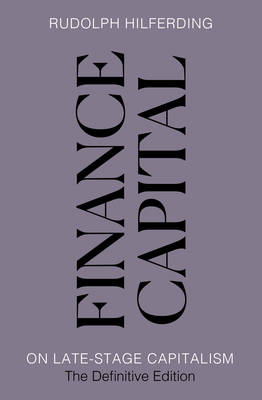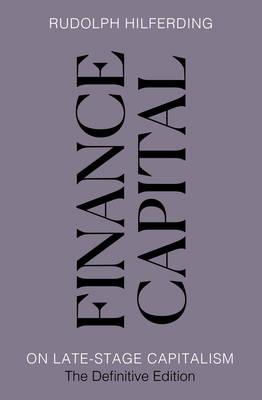
- Afhalen na 1 uur in een winkel met voorraad
- Gratis thuislevering in België vanaf € 30
- Ruim aanbod met 7 miljoen producten
- Afhalen na 1 uur in een winkel met voorraad
- Gratis thuislevering in België vanaf € 30
- Ruim aanbod met 7 miljoen producten
Zoeken
Finance Capital
On Late-Stage Capitalism, the Definitive Edition
Rudolph Hilferding
Paperback | Engels
€ 62,45
+ 124 punten
Uitvoering
Omschrijving
New translation of a crucial study of modern capitalism, famously used by Lenin as his basis for analyzing imperialism. This is a new translation by Ben Fowkes of the classic book by the twentieth century German socialist leader Rudolf Hilferding, first published in 1910. Finance Capital offers an unusual Marxist pathway towards an understanding of macroeconomics and financialisation. But the study also illuminates the background to the First World War (and indeed wars in general). It was famously used by Lenin as the basis for his analysis of imperialism. Hilferding's three-way comparison between the US, UK and German systems of finance and economics is given extra zest by his concentration on specific firms, banks, and banking systems. He pursues capital through its manifold configurations, always stressing the social meaning of individuals' actions. He demonstrates how the industrial, commercial and financial sectors of the economy became increasingly intertwined during the late 19th century, showing the impact of changes in the financial sphere on the policies of the European powers towards the non-European world, including colonial expansionism in Africa and Asia. Hilferding's book ends with a moving exhortation to his readers to end wars by ending the rule of finance capital. This didn't happen, but his work continues to have relevance over a hundred years later.
Specificaties
Betrokkenen
- Auteur(s):
- Vertaler(s):
- Uitgeverij:
Inhoud
- Aantal bladzijden:
- 656
- Taal:
- Engels
Eigenschappen
- Productcode (EAN):
- 9781804299142
- Verschijningsdatum:
- 4/08/2026
- Uitvoering:
- Paperback
- Formaat:
- Trade paperback (VS)
- Afmetingen:
- 152 mm x 234 mm
- Gewicht:
- 367 g

Alleen bij Standaard Boekhandel
+ 124 punten op je klantenkaart van Standaard Boekhandel
Beoordelingen
We publiceren alleen reviews die voldoen aan de voorwaarden voor reviews. Bekijk onze voorwaarden voor reviews.








